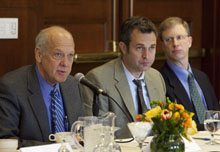
March 18, 2009 — Stories of workplace horrors, dishonest mayors, regulatory negligence and seedy landlords were shared by the six finalists for the 2009 Goldsmith Prize for Investigative Reporting the day after the awards ceremony.
- Read the Transcript
In the Goldsmith seminar, titled “The Present and Future of Investigative Reporting,” journalists from the Charlotte Observer, Detroit Free Press, New York Times, Pittsburgh Post-Gazette, Washington Post and ProPublica recounted their dogged efforts to root out and expose corruption through the power of the media.
“Our goal all along was to tell the people of Detroit whether or not they had an honest mayor,” said M.L. Elrick of the Detroit Free Press, who, along with his colleague Jim Schaefer, uncovered a pattern of lies and financial malfeasance by former Detroit mayor Kwame Kilpatrick in their series “A Mayor in Crisis.” Kilpatrick finally resigned after the paper unveiled the mayor’s longtime affair with his chief-of-staff, and his role in a $9 million out-of-court settlement in a related court case involving fired city police officers.
Observer reporters Ames Alexander and Franco Ordonez, honored for their series of stories titled “The Cruelest Cuts,” spoke of the horrifying stories they heard from workers at a North Carolina poultry plant, a plant which had reported surprisingly few on the job injuries.
“Things really started getting interesting,” Ames stated, when he and Ordonez began speaking directly with workers, one of whom claimed he was brought back to work just an hour after surgery on his wrist. “The saddest part was that immigrant workers seemed to think it was just part of the deal to be exploited by a big American company,” said Ordonez.
The investigative-reporting award winners — Debbie Cenziper and Sarah Cohen of the Washington Post — discussed how they uncovered disturbing patterns of landlord abuse and tenant suffering in their series of stories, “Forced Out,” which detailed how dozens of rent-controlled building owners in Washington allegedly drove out renters by shutting off heat, water and power.
“We were able to establish a pattern of landlords trying to cash in on the real estate market in DC and doing cruel things to families,” Cenziper recounted. And in the process, Cohen said, city officials learned just how lax their oversight had been. “They were shocked about their own negligence,” she said.
Reporter David Barstow of the New York Times recollected his own shock in learning how several military analysts providing perspective on the Iraq war for television networks were also on the payrolls for companies profiting from the war, and were provided talking points by the Pentagon for their television interviews. His series, “Message Machine,” spoke to the “rise of the spin industry,” Barstow said, and the undue influence of connected consultants in Washington.
An innocent check of academic credentials led to a blockbuster series of stories, “Degree of Influence,” published by the Post-Gazette. Reporters Patricia Sabatini and Len Boselovic told how Heather Bresch, a well-connected pharmaceutical executive, lied about having received a graduate degree at a West Virginia University and how the school attempted to cover up for her.
“Heather said her word is better than a transcript, and that for anyone to question her word was offensive, and that there is no more to say on that,” said Sabatini. “I remember thinking, ‘I don’t think so.’ ” In light of the newspaper coverage, the university’s president, provost and business school dean were forced to step down.
ProPublica reporter Abrahm Lustgarten, honored for his series, “Buried Secrets,” about the risks posed by natural gas drilling to the water supply, told how he “tried to draw a big picture by connecting the dots.” Although drilling efforts continue, Lustgarten said, there are new efforts underway in Congress designed to provide more oversight.
Jane Meyer, winner of the Goldsmith trade book prize for The Dark Side: The Inside Story of How the War on Terror Turned into a War on American Ideals, also participated in the panel discussion. “What was missing was accountability in this story,” she said of her subject. “It’s incredibly important in a democracy to know who is in charge of doing certain actions.”
This article is based on one written by Doug Gavel of Harvard Kennedy School Communications. The original article is here.

